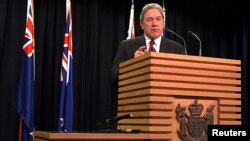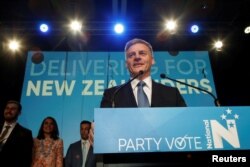New Zealand's major political parties headed into their fifth and final day of talks about forming a new coalition government on Thursday, almost three weeks after an inconclusive general election.
The board of the nationalist New Zealand First party that holds the balance of power in negotiations with the ruling center-right National Party and the challenging center-left Labor Party will then meet on Friday to discuss its options.
Both National and Labor need NZ First to form a coalition government after failing to win enough seats to form a government outright at the Sept.23 vote.
The political deadlock has weighed on the New Zealand dollar, the world's 11th most-traded currency. The Kiwi has fallen around 3.5 percent since the election against the U.S. dollar. It was trading at $0.7086 on Thursday morning.
The uncertainty has been compounded by concerns that a government including the nationalist NZ First would lead to more economically interventionist policies.
NZ First has said it favors more central bank intervention in the foreign exchange market. It also wants to restrict foreign investment, curb immigration and renegotiate certain trade deals.
NZ First leader Winston Peters said the discussions so far had focused on policy, with no talks yet on ministerial portfolios or offices.
"We're not going to think about offices and positions until we're happy with the policy," Peters told reporters late on Wednesday.
Peters said he aimed to conclude negotiations by Thursday evening to report back options to the board, likely on Friday.
He said he expected an agreement of more than 75 percent in the decision of which party to support.
"You want a serious consensus," he said. "If you haven't got a serious consensus, stay there until you get one, but who wants a 50-50 vote?"
Peters lost his own seat in the election to a National candidate but remains the lead negotiator and eligible for a ministerial post as leader of NZ First under New Zealand's proportional representation system.






